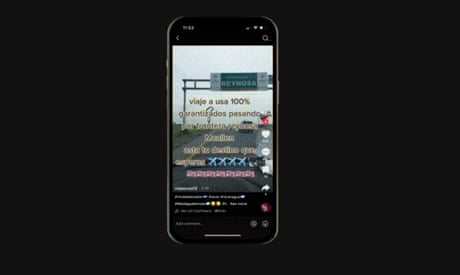- by foxnews
- 04 Apr 2025
Revealed: how coyotes and scammers use TikTok to sell migrants the American dream
Revealed: how coyotes and scammers use TikTok to sell migrants the American dream
- by theguardian
- 24 Oct 2022
- in technology

The TikTok video starts like most other travel snaps on the platform do, with selfie shots showing the user* and his companions sitting on a plane and walking through the airport.
Some of the posts, like the one from the user from Ecuador, appear to be from people documenting their own migrant journeys. But many purport to offer services and advice for people seeking to immigrate from countries including Guatemala, Mexico, Ecuador and Honduras.
The posts offering services are usually simple. They often include hazy footage of a journey or a US cityscape, typically overlaid with a message that seeks to assure users the service is not a scam. Some posts go as far as to show videos and pictures of people who have supposedly successfully crossed with the help of those behind the account.
Quantifying the proliferation of these type of posts on TikTok is difficult because the platform does not provide external tools that allow researchers to audit or analyze its data, unlike companies like Twitter and Meta.
The Guardian shared eight examples of posts advertising services to ferry people across the border and Obi-Okoye said the company took them down. Still, dozens of similar videos pop up when searching for these terms, including some that were posted in the last week.
The videos the Guardian reviewed show that TikTok has started to play a more critical role in the spread of posts targeting migrants than what researchers initially observed.
But TikTok, which has more than 1 billion monthly active users globally, has exploded in Latin America in the last four years. Recent estimates from market research firm eMarketer indicate the platform surpassed 100 million users in Latin America, making it the third largest social network in the region after Instagram and Facebook.
One of the top-liked posts on the topic has more than 70,000 likes, over 5,000 comments and has been saved nearly 5,000 times. The average video on the subject has at least 100 likes and a dozen comments.
Organic engagement on these posts is high and indicates the platform is no longer simply serving as a video creation platform for these accounts. Based on a survey of more than 50 TikToks, the Guardian found that most commenters asked for more information.
But a new report from Time magazine indicates that to keep pace with its growth in Latin America, TikTok has contracted with hundreds of content moderators through a third-party firm in Colombia. Some of those moderators who spoke to Time said they were overworked and underpaid: they said they worked six days a week, were paid as little as $254 a month and yet were expected to meet lofty performance goals. They also said they were exposed to emotionally traumatic content and were offered little mental health support as they were tasked with taking down disturbing posts that ranged from murder to cannibalism.
* The Guardian has reached out to the user, but is not identifying him, nor the users behind similar accounts described in the story, to protect their safety.
Kari Paul contributed reporting
- by foxnews
- descember 09, 2016
'I traveled for an entire year for free - and saved $15K'
Hailey Learmonth explored Australia without paying rent, thanks to pet sitting. She saved $15,000, lived on farms, and embraced remote work to travel on a budget.
read more





